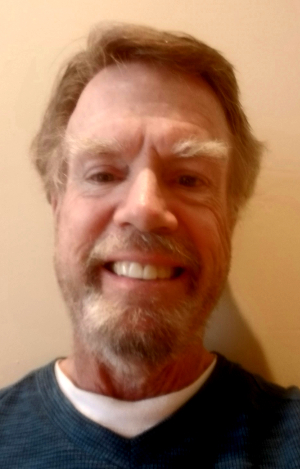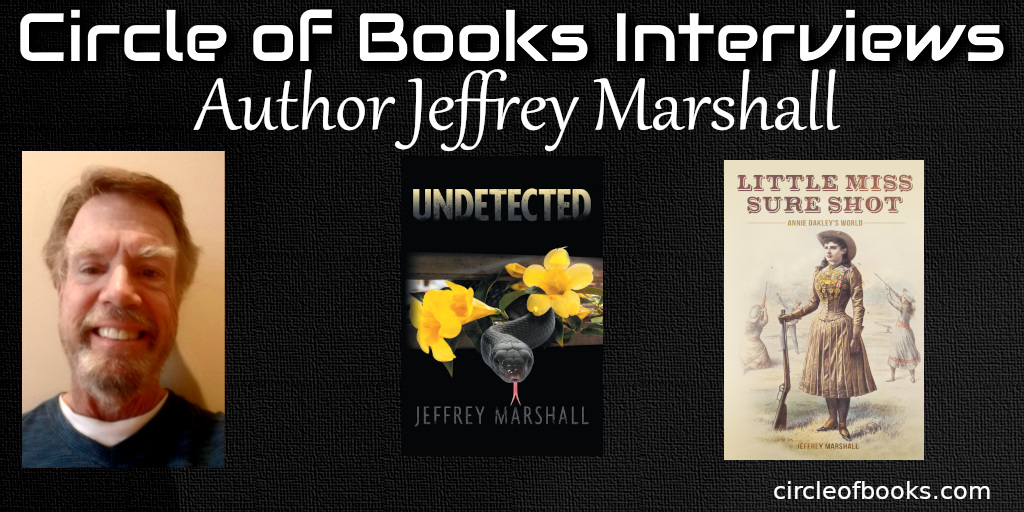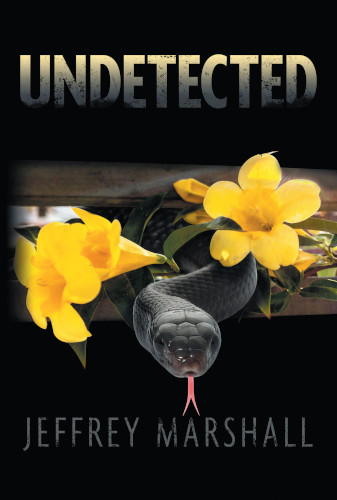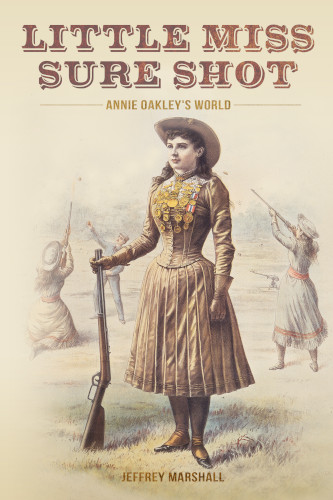Interview – Jeffrey Marshall

Interview
– When did you start writing novels, what moved you to start writing?
I started in 2014, a number of years after retiring as a journalist and moving to Arizona. I was looking for another creative outlet; writing has been a passion for many years. I published a book of collected poems in 2009, but decided a few years later that I wanted to try my hand at fiction.
– Tell us about your books. Why should everyone buy them?
My novels Little Miss Sure Shot and Undetected are very different. The first is historical fiction, centered on the facts surrounding the life of Annie Oakley. I read several good biographies and then set my imagination to work, much like a jazz musician using a basic melody and then riffing off it. Undetected, on the other hand, is a psychological thriller about a woman who comes into a new family. Suzy Perry has a past, but her new family is ignorant of it at first. Then, her new son-in-law starts digging, and with the help of a private investigator, finds out a great deal about her – much of it suspicious. When Suzy is confronted with some of this, she flees to the safety of a childhood friend who knows nothing of what she’s done.
Readers who appreciate colorful description and strong, evocative writing will find plenty of these in the two books. Both are relatively short, have strong narrative pace and can be read quickly.
– What is your all time favorite novel/book? What makes it special?
A very hard choice, but I settled on Robert K. Massie’s Nicholas and Alexandra, the story of the Russian Revolution and the demise (and execution) of the tsar and his family. It’s an exotic tale about family love, wealth and poverty, betrayal and adversity, and an unforgettable character in the mad monk, Rasputin, who became a confidante to the royal family. Some 50 years after reading it, it still resonates in my memory.
– Tell us a bit about your writing process.
I write in bursts, often in the morning, and for no more than a few hours at a time. I write quickly, especially dialogue, and find that my first drafts are largely intact after various stints of polishing and editing. Most of that revolves around cutting and sharpening scenes.
Coming from a journalistic background, I tend to use shorter, crisper sentences than some literary writers, while still trying to work in metaphor and simile.
– What author would you love to have dinner with?
Carl Hiassen, the satirist who has made a career of chronicling weird and memorable characters in his home state of Florida. Hiassen has found a formula for humor – often laugh-out-loud – that I find incredibly challenging to duplicate, and I’d love to hear his thoughts on how it’s done.
– Tell us about your hobbies and passions other than writing.
Probably very conventional for someone my age with my background: tennis, golf, fly-fishing, travel, movies, word games (especially crosswords), fine dining. Most of these can be traced back to my childhood.
– We have many followers who would like to start writing a book or are already writing their first book, any advice for these brave people?
Stick to it. Don’t get discouraged by the time involved or the prospects for publication. Self-publishing has completely changed the paradigm, and anyone can be published – if they’re willing to pay the tab. Writing is hard work; the people who churn out books have a formula and great muscle memory, if you will. Most of us don’t have that, and may struggle, especially with fiction, which requires careful attention to things like point of view, plot and character development.
I’d also urge you to get feedback from others – your friends, family, any other writers you may know. You may not get consensus, but you’ll probably get good input on how well your book is working for them, and on things you might change.
– How often do you write, daily, every other day or?
Probably every other day right now, having completed a third novel and being in the process of polishing it. When I was deep in the throes of writing it, I was working every day.
– How important is it to get your facts right and are there any instances when you bend history to fit your story?
In Little Miss Sure Shot, my historical novel about Annie Oakley, I strove to stick to the known facts of her life as the scaffolding for the book. But from there, I felt free to imagine many of the details – what things looked like, people she may have met, etc. So, I may not have bent history, but I went beyond it to embellish her life and the world around her.
– What are you reading at the moment?
The Monkey Wrench Gang, Edward Abbey’s famed novel about environmental protesters in the Southwest in the 1970s.
– How is it to be an author in your country? Do you have a good support from the local public?
I think it’s fair to say that indie authors anywhere in the U.S. are often in something of a bubble, isolated from other writers. The reading public is fixated on best-sellers and airport-distributed books, and my own experiences with local bookstores have been very unhappy. There are online communities of indie authors, but I’ve found those quite superficial and largely devoted (understandably) to promoting their own books. I’ve been guilty of some of the same!
– Certainly you have had some interesting episodes as an author, fans related or others, share one of them with us.
I worked with a library in the Phoenix area that was interested in promoting local authors. I developed a presentation about my latest novel and shared it with the organizer, who promoted it quite effectively, I thought, to library patrons. But when I showed up, there were only four people plus my wife in the audience. It was essentially a private event! The lesson may be that unless you’re a well-known author with a large readership or a celebrity profile, people just won’t invest the time to hear you. That’s a discouraging message, and I hope I’m wrong, but…
– A final message for our circleofbooks.com readers.
Reading, whether fiction or non-fiction, is an escape vehicle from the pressures of the everyday world, especially in this pandemic. I’d encourage you to read whenever the mood or occasion suits, and to find the joy in words and images that can enrich your life.
Thank you Jeffrey Marshall. We at circleofbooks.com wish you much success!
Click here to visit the author page here on Circle of Books.
Tweet


